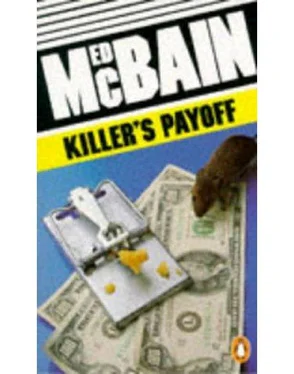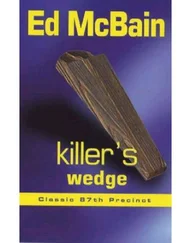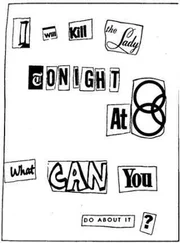McBain, Ed - Killer's Payoff
Здесь есть возможность читать онлайн «McBain, Ed - Killer's Payoff» весь текст электронной книги совершенно бесплатно (целиком полную версию без сокращений). В некоторых случаях можно слушать аудио, скачать через торрент в формате fb2 и присутствует краткое содержание. Жанр: Полицейский детектив, на английском языке. Описание произведения, (предисловие) а так же отзывы посетителей доступны на портале библиотеки ЛибКат.
- Название:Killer's Payoff
- Автор:
- Жанр:
- Год:неизвестен
- ISBN:нет данных
- Рейтинг книги:5 / 5. Голосов: 1
-
Избранное:Добавить в избранное
- Отзывы:
-
Ваша оценка:
- 100
- 1
- 2
- 3
- 4
- 5
Killer's Payoff: краткое содержание, описание и аннотация
Предлагаем к чтению аннотацию, описание, краткое содержание или предисловие (зависит от того, что написал сам автор книги «Killer's Payoff»). Если вы не нашли необходимую информацию о книге — напишите в комментариях, мы постараемся отыскать её.
Killer's Payoff — читать онлайн бесплатно полную книгу (весь текст) целиком
Ниже представлен текст книги, разбитый по страницам. Система сохранения места последней прочитанной страницы, позволяет с удобством читать онлайн бесплатно книгу «Killer's Payoff», без необходимости каждый раз заново искать на чём Вы остановились. Поставьте закладку, и сможете в любой момент перейти на страницу, на которой закончили чтение.
Интервал:
Закладка:
“I’d appreciate that.”
“What was the number there again?”
“Frederick 7-8024.”
“Okay, I’ll check into it.”
“Thank you, Mr. Boone.”
“Not at all,” he said, and he hung up.
The telephone would occupy Bert Kling for the rest of the afternoon. He would learn nothing from it. Or at any rate, he would learn a negative something.
He would learn that none of the model registries had ever carried a girl named Lucy Starr Mitchell.
MEYER MEYER did not mind being a tail, especially when the tail was tacked to the behind of Lucy Mencken. Lucy Mencken had a very nice behind.
On July second, Meyer was parked up the street from the Mencken house in a plain pale blue sedan. At 8:05 A.M., a man answering the description of Charles Mencken left the house. At 9:37, Lucy Mencken went to the garage, backed out a red MG, and headed for the town of Peabody. Meyer followed her.
Lucy Mencken went to the hairdresser, and Meyer waited outside.
Lucy Mencken went to the post office, and Meyer waited outside.
Lucy Mencken had lunch at a quaint exurban teashop, and Meyer waited outside.
She went into a dress shop at 1:04.
By 2:15, Meyer began to suspect the awful truth. He got out of the sedan, walked into the shop, and then through it to the other side. As he’d suspected, there was another doorway at the far end of the shop. Lucy Mencken, by accident or design, had shaken her tail. Meyer drove back to the Mencken house. He could see the garage at the far end of the curving driveway. The red MG was not in it. Sighing heavily, he sat back to await her return.
She did not check in until 6:15.
Meyer went to dinner and then phoned Lieutenant Byrnes. Shamefacedly, he admitted that an exurban housewife had shaken him for five hours and eleven minutes.
The lieutenant listened patiently. Then he said, “Stick with it. She’s probably home for the night. In any case, Willis’ll be out to relieve you soon. What do you suppose she did during those five hours?”
“She could have done anything,” Meyer said.
“Don’t take it so big,” Byrnes said. “Peabody hasn’t reported any homicides yet.”
Meyer grinned. “I’ll be expecting Willis.”
“He’ll be there,” Byrnes said, and he hung up.
Meyer went back to his vigil in the sedan. At 9:30 P.M., Willis relieved him. Meyer went home to bed. His wife, Sarah, wanted to know why he looked so down in the mouth.
“I’m a failure,” Meyer said. “Thirty-seven years old and a failure.”
“Go to sleep,” Sarah said. Meyer rolled over. He did not once suspect that he himself had been tailed that afternoon, or that he’d led his follower directly to the home of Lucy Mencken.
IT WAS WEDNESDAY MORNING, July third.
A week had gone by since Sy Kramer had been shot from an automobile. The police had not learned very much during that week. They now knew where the monthly $500 and $300 deposits had originated. There was also a monthly $1,100 deposit in Kramer’s working account, but they had not yet learned from whom that had come—and possibly they would never learn.
Nor did they know where the huge sums deposited in the other account had come from.
A check of Kramer’s living habits had disclosed to the police that his taste was expensive, indeed. His suits were all hand-tailored, as were those of his shirts that had not been imported. His apartment had been furnished by a high-priced decorator. His whisky was the best money could buy. He owned two automobiles, a Cadillac convertible and a heavy-duty station wagon. The acquisitions were all apparently new ones, and this presented a puzzling aspect to the case.
The monthly deposits in Kramer’s working account totaled $1,900. The withdrawals kept steady pace with the deposits. Kramer liked to live big, and he had been spending close to $500 a week. But the sum of $45,187.50 in the other account had not been touched. How, then, had he managed to buy the two automobiles, to pay for the furniture and the decorator, to afford the closetful of suits and coats?
How do you buy things without money?
You don’t.
The Cadillac agency from which Kramer had purchased the automobile reported that it had been purchased during the latter part of the preceding September, and that Kramer had paid for it in cold, hard cash. The Buick station wagon had been purchased on the same day from an agency across the street in Isola’s Automobile Row. Again, the purchase had been made in cash.
Kramer had rented his apartment in September. He had paid for the furniture and the decorator in cash. The total bill had come to $23,800. His suits had been ordered in September, delivered in October. They had cost him $2,000—and he had paid for them with green United States currency.
Kramer, in short, had barefootedly run through $36,000 in cash in less than a month—and had managed to acquire a lovely mistress named Nancy O’Hara during that same wild spending spree. And then, on October twenty-third, he had deposited the staggering amount of $21,000 in his bank account!
From where had that original $36,000 come?
And from where had the subsequent deposits of $21,000 in October, $9,000 in January, and $15,000 in April come?
And had that $15,000 deposit been intended as the last one? Or had more payments been scheduled to come? Who had been making the payments? Who had already paid a total of $81,000, and had this person been let off the hook only because Kramer was now dead?
And had not the extortion of $81,000 been sufficient reason for murder?
The body of Sy Kramer lying in the morgue seemed to indicate that it had indeed been reason enough.
THE GRAND AND GLORIOUS Fourth came in with a bang.
Some of the bulls of the 87th had the holiday off; the rest had to work. There was plenty to keep them occupied. In cooperation with the uniformed cops of the precinct, they tried to keep the day a safe and sane one. It was not.
Despite the city’s law against fireworks, the importers had been busy, and everyone from six to sixty stood ready and anxious to apply a match to a fuse and then to stand back with his fingers in his ears. A kid on South Thirtieth lost an eye when another kid hurled a cherry bomb at his face. On Culver Avenue, two boys were shooting skyrockets from the roof. One fell over the edge and died the instant he hit the pavement.
It was not a very hot Fourth—there had been hotter Fourths—but it was a very noisy one. The noise was an excellent cover for those citizens who wanted to fire revolvers. You couldn’t tell an exploding firecracker from an exploding .32 without a program, and nobody was selling programs that day. The police were busy chasing kids with fireworks, and turning off fire hydrants, and trying to stop burglaries that were being committed under cover of all the confusion and all the noise. The police were busy watching sailors who came uptown for a piece of exotica and very often went back downtown with a piece of their skulls missing. The police were busy watching the teen-age kids, who, now that school was over, now that time lay heavily on their hands, now that the asphalt streets and the concrete towers cradled them with boredom, now that there was nothing to do and plenty of time to do it in, were anxious for excitement, anxious for kicks, anxious for a little clean-living adolescent sport. They roamed the streets, and they roamed Grover Park, spoiling for action, and so the cops were kept busy.
Everyone was celebrating but the cops.
The cops were cursing because they had to work on a goddamn holiday.
Each of them wished he’d become a fireman.
AT THE FIREHOUSE in the 87th Precinct territory, the gongs were ringing and the men were sliding down poles and grabbing for helmets, because there’d be more damn fires today than on any other day of the year.
Читать дальшеИнтервал:
Закладка:
Похожие книги на «Killer's Payoff»
Представляем Вашему вниманию похожие книги на «Killer's Payoff» списком для выбора. Мы отобрали схожую по названию и смыслу литературу в надежде предоставить читателям больше вариантов отыскать новые, интересные, ещё непрочитанные произведения.
Обсуждение, отзывы о книге «Killer's Payoff» и просто собственные мнения читателей. Оставьте ваши комментарии, напишите, что Вы думаете о произведении, его смысле или главных героях. Укажите что конкретно понравилось, а что нет, и почему Вы так считаете.












